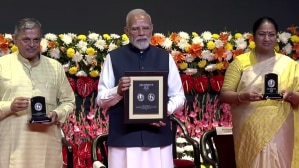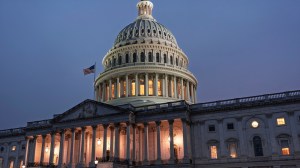In Rajasthan, reforms give way to populism
If the Shiv Sena ousted Suresh Prabhu midway through the reforms process, the Congress high command set the precedent in Rajasthan three-and...

If the Shiv Sena ousted Suresh Prabhu midway through the reforms process, the Congress high command set the precedent in Rajasthan three-and-a-half months ago.
Putting the brakes on the state’s power reforms, Energy Minister Dr Chandrabhan was replaced by the senior-most Jat leader, Ram Narain Chaudhary, for political considerations, apparently to appease the state’s largely Jat community angered by the sharp increase in power tariff.
Ever since, Chandrabhan’s bulldozing approach to reforms has given way to Chaudhary’s populism. As the minister declares: ‘‘I want to make everyone happy. I will do everything to protect farmers’ rights.’’
Thus, the much-hyped move to disconnect power to defaulting villages has been almost stopped now. So is the drive to install new electricity meters in villages.
The thrust now is on granting out-of-turn connections to big farmers. Says an official: ‘‘The new minister’s only concern is to ‘‘supply’’ to the rural areas not revenue increase or vigilance. A farmer himself, he is pandering to the 6 lakh agricultural consumers. Unlike his predecessor, he is amenable to pressure.’’ Adds a politician: ‘‘Chaudhary was never a votary of reforms. He is now running the sector like a Social Welfare Division. He doesn’t care about the commercial angle.”
Worse, the government has failed to raise the power tariff this year, one of the World Bank’s main stipulations for reduction in the gap between revenue and expenditure. The application for tariff revision was to have been filed with the Regulatory Commission by December 31 last year, but has been shelved because of the coming elections.
As a consequence, the deficit for 2001-2002 hovers at Rs 1,250 crore. Says an official: ‘‘Had there been a ten per cent tariff increase this year, we would have reduced the deficit to just Rs 500 crore.’’ So far, the state has not indicated to the commission how it intends to reduce the gap.
A World Bank team is scheduled to visit the state this October, to convey their verdict on the pace of reforms. Says a senior official: ‘‘They are naturally investment driven and have the right to suspend disbursements, though the state will use the drought argument to dissuade them, but that holds good only from June.’’
Chaudhary, though, exudes optimism: ‘‘The World Bank is a moneylender after all, but I’m sure they will be liberal in times of calamity.’’
The state’s Energy sector is passing through a critical phase, as electoral considerations are now paramount. The head of a power company points out: ‘‘Without tariff increase, we definitely require higher government subsidy which is just Rs 450 crore this year. All gains of reforms might be neutralised if no action is taken.”



- 01
- 02
- 03
- 04
- 05




























